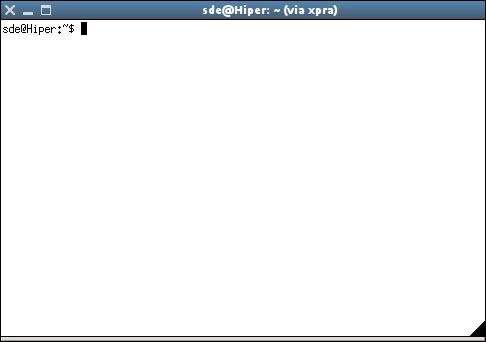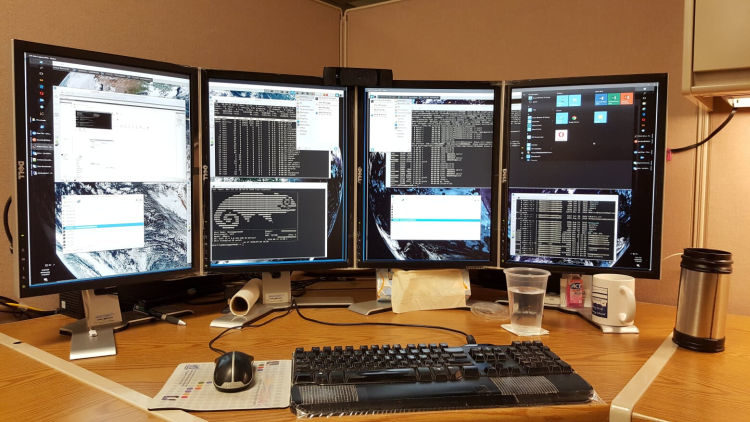xpra (X Persistent Remote Applications) is ‘screen for X’. This application allows users to run X programs, usually on a remote host, direct their display to your local machine, and then to disconnect from these programs and reconnect from the same or another machine, without losing any state.
It therefore differs from standard X forwarding in that it allows disconnection and reconnection without disrupting the forwarded application. Another difference is that xpra is “rootless” i.e., programs run under it show up on the desktop as regular programs, managed by the standard window manager, instead of being confined inside a box.
Xpra uses a custom protocol that is self-tuning and relatively latency-insensitive, and is therefore usable over network connections that are too slow or unreliable for standard X forwarding.
Features include:
- System tray menu for easy disconnection.
- Memory Mapped data transfers for local connections.
- JPEG and PNG image compression (optional), including adaptive JPEG mode (bandwidth constrained).
- Non-US keyboard layout support.
- Handles screen update storms and fast screen refresh rates.
- Much lower CPU overhead in network code.
- Support for password protection option for securing plain TCP connections.
- Forwarding of system bell and custom application cursors.
- Forwarding of application notifications (requires its own dbus daemon).
- Support for Xdummy and the RandR extension which fixes a number of otherwise unfixable display bugs (ie: #1, #2).
- Ability to disable pulseaudio and clipboard synchronization.
- Clean client disconnection.
Website: github.com/Xpra-org/xpra
Support:
Developer: Nathaniel Smith, Antoine Martin
License: GNU General Public License v2.0

xpra is written in Python. Learn Python with our recommended free books and free tutorials.
Return to Terminal Multiplexers | Return to Remote Desktop Clients
| Popular series | |
|---|---|
| The largest compilation of the best free and open source software in the universe. Each article is supplied with a legendary ratings chart helping you to make informed decisions. | |
| Hundreds of in-depth reviews offering our unbiased and expert opinion on software. We offer helpful and impartial information. | |
| The Big List of Active Linux Distros is a large compilation of actively developed Linux distributions. | |
| Replace proprietary software with open source alternatives: Google, Microsoft, Apple, Adobe, IBM, Autodesk, Oracle, Atlassian, Corel, Cisco, Intuit, SAS, Progress, Salesforce, and Citrix | |
| Awesome Free Linux Games Tools showcases a series of tools that making gaming on Linux a more pleasurable experience. This is a new series. | |
| Machine Learning explores practical applications of machine learning and deep learning from a Linux perspective. We've written reviews of more than 40 self-hosted apps. All are free and open source. | |
| New to Linux? Read our Linux for Starters series. We start right at the basics and teach you everything you need to know to get started with Linux. | |
| Alternatives to popular CLI tools showcases essential tools that are modern replacements for core Linux utilities. | |
| Essential Linux system tools focuses on small, indispensable utilities, useful for system administrators as well as regular users. | |
| Linux utilities to maximise your productivity. Small, indispensable tools, useful for anyone running a Linux machine. | |
| Surveys popular streaming services from a Linux perspective: Amazon Music Unlimited, Myuzi, Spotify, Deezer, Tidal. | |
| Saving Money with Linux looks at how you can reduce your energy bills running Linux. | |
| Home computers became commonplace in the 1980s. Emulate home computers including the Commodore 64, Amiga, Atari ST, ZX81, Amstrad CPC, and ZX Spectrum. | |
| Now and Then examines how promising open source software fared over the years. It can be a bumpy ride. | |
| Linux at Home looks at a range of home activities where Linux can play its part, making the most of our time at home, keeping active and engaged. | |
| Linux Candy reveals the lighter side of Linux. Have some fun and escape from the daily drudgery. | |
| Getting Started with Docker helps you master Docker, a set of platform as a service products that delivers software in packages called containers. | |
| Best Free Android Apps. We showcase free Android apps that are definitely worth downloading. There's a strict eligibility criteria for inclusion in this series. | |
| These best free books accelerate your learning of every programming language. Learn a new language today! | |
| These free tutorials offer the perfect tonic to our free programming books series. | |
| Linux Around The World showcases usergroups that are relevant to Linux enthusiasts. Great ways to meet up with fellow enthusiasts. | |
| Stars and Stripes is an occasional series looking at the impact of Linux in the USA. | |
